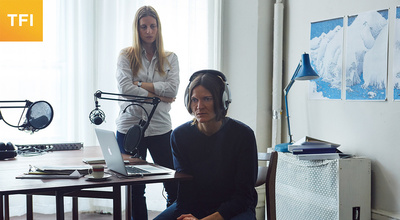 Self-reflective horror films are pretty common these days since the language of the genre is so well known by film fans. In Women Who Kill, a woman who is obsessed with real-life killers faces the fact that her love life is just as nefarious as the serial killers she follows.
Self-reflective horror films are pretty common these days since the language of the genre is so well known by film fans. In Women Who Kill, a woman who is obsessed with real-life killers faces the fact that her love life is just as nefarious as the serial killers she follows.
Morgan (Ingrid Jungermann, who also wrote and directed the film) and Jean (Ann Carr) are ex-lovers who co-host a podcast about female serial killers. To complicate matters, they also still live together in the same apartment in Park Slope, Brooklyn (how they afford to live there when they appear to have no other jobs other than hosting the podcast is the film’s real mystery). They bicker like an old married couple over their past history, tough Morgan is clearly the more emotionally detached to this complicated situation of the two. Curiously, despite their shared obsession with female mass murders, both Morgan and Jean are timid people, which they confront when Morgan meets the attractive, mysterious Simone (Sheila Vand) at her co-op (so Brooklyn, right?). Morgan dives into a relationship with Simone, much to the disappointment of her best friend Alex (the very funny Shannon Patricia O’Neill) as well as seething jealousy from Jean. Alex and Jean’s concerns turn out to have merit – as Morgan falls deeper in love with Simone, she learns that the mystery that attracts her to Simone in the first place might be the one thing she should really be fearful of.
Morgan’s humor mostly consists of dry, condescending barbs – the type that make you laugh not only because they’re funny, but also because you’re relieved that they’re not directed at you. As Alex points out, Morgan has a tendency to nitpick the flaws in everyone and everything around her (her reason for not sitting on the grass in the park? “Urine”). Except when it comes to Simone and her (literal) box of mysteries – then her instincts for investigation go out the window.
There are several technical aspects of Women Who Kill that are wonderfully done. The score by Ivan Howard increasingly becomes reminiscent of classic horror movie themes as the mystery deepens, and the Brooklyn apartment doors and floors creek like the thirteenth floor of a haunted hotel (credit goes to the sound designer, Eli Cohn).
Unfortunately, the wit that makes the film so enjoyable all but disappears by the final act. While there is nothing wrong with a film going from a humorous tone to a more serious one, a viewer expects the latter tone to be as compelling as the one that hooked ‘em in the first place. Women Who Kill ultimately builds to an inconclusive finale that is, at best, unsatisfying based on the magnitude of the mystery involved. Clues left as apparent major plot points are left unacknowledged, as if Jungermann didn’t know how to get out of the story. It’s a letdown that the film doesn’t put the pieces together better in the end. Horror and mystery movies can obviously end somewhat unresolved – most of the classic ones leave plenty of unanswered questions – but Women Who Kill ends so abruptly it leaves too much to much for the audience to ponder and not enough for the audience to enjoy.
















Recent Comments